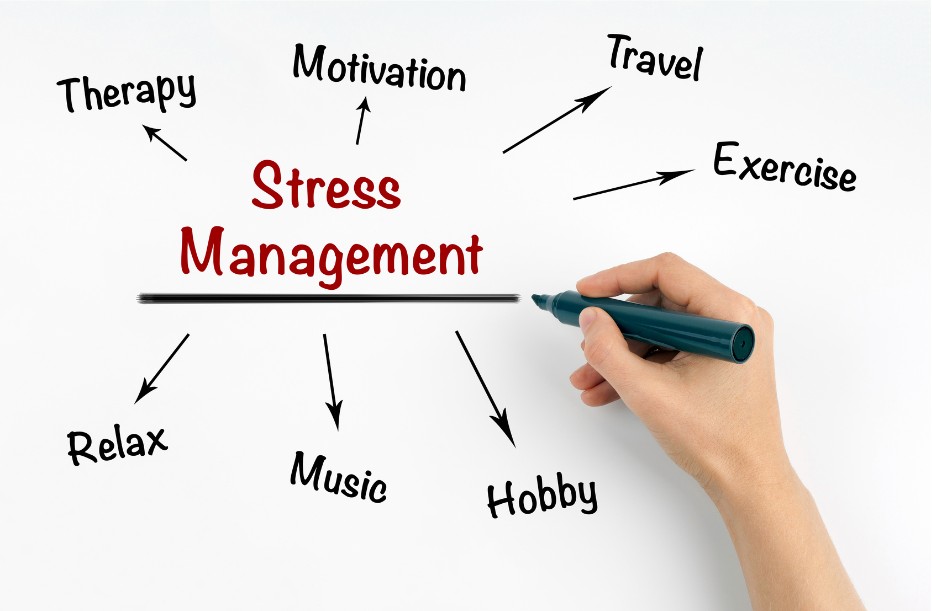Beating Stress: 10 Effective Ways to Get Rid of Stress?

Stress is the natural response of our body to any situation that demands adaptation or a response. When faced with challenges, our body undergoes physical, mental, and emotional reactions. While stress is a normal and innate aspect of life, it can be advantageous in certain circumstances, providing an energy surge and aiding in overcoming daily challenges. However, if stress becomes chronic or overwhelming, it can have harmful effects on health, well-being, and overall quality of life. Hence, Beating stress is significant to improve quality of life. Learn 10 Effective Ways of Beating Stress in the blog below.
According to the Mental Health Foundation, 60% of adults who are consistently stressed experience anxiety. Hence, Beating stress is crucial to achieving overall well-being.
The Impact of Stress
There can be significant and multifaceted impacts of stress on the human body:
Physically, stress may cause a range of discomfort and health issues. This includes headaches, fatigue, sleep disturbances, muscle tension or pain, and even elevated blood pressure. Over time, any of these factors (s) can lead to more serious health-related problems.
Psychologically, stress can result in feelings of anxiety, restlessness, and unrest. It can cause mood swings, difficulty focusing, and depressive symptoms. Depression or anxiety are related to stress. The impact of stress extends to one’s overall well-being, potentially affecting personal relationships, work productivity, and general enjoyment of life.
Identifying Stressors
Identifying stressors, the specific situations or conditions that induce stress is crucial for effective stress management. Stressors are highly personal and can range from major life events like moving homes or losing a job, to daily hassles like traffic jams or work deadlines. They can even include environmental factors like noise and crowding, or lifestyle choices such as poor diet or lack of sleep.
By identifying these triggers, you can gain a clearer understanding of what’s causing you stress. This self-awareness is the first step towards developing coping strategies, allowing you to deal with stressors more effectively.
10 Effective Ways of Beating Stress

Here are 10 effective ways of beating stress to achieve the much-deserved peace of mind:
1. Mindfulness Meditation – Best for Beating Stress
Mindful meditation practice promotes relaxation, increases self-awareness, and reduces negative emotional responses to stress. With regular meditation practice, you develop a state of tranquil calmness that aids in managing stress effectively.
This can be as simple as focusing on your breath, concentrating on God, chanting a mantra, observing your thoughts and feelings, or even paying attention to the sensory details of daily activities, such as relaxed eating.
2. Regular Exercise – Effective for Beating Stress
Engaging in regular physical activities stimulates the release of endorphins, which are neurotransmitters in the brain that serve to elevate mood and act as natural analgesics, creating a positive feeling within the body.
Regular exercise can improve your mood, serve as a distraction from worries, and enhance your sense of well-being. It also improves sleep, which is often disrupted by stress. The key is to find activities you enjoy, like dancing, biking, swimming, or even gardening, and to incorporate them into your routine regularly.
3. Balanced Diet – Significant for Beating Stress
What we eat directly affects our physical health and indirectly influences our mood and stress levels. Maintaining a balanced diet that includes fruits, vegetables, proteins, and whole grains will aid in sustaining consistent blood sugar levels, and in turn, contribute to mood stability.
Eating nutrient-dense foods, rich in antioxidants and vitamins, can also help boost the immune system, making us more resilient to stress. Staying well-hydrated and moderating the consumption of stimulants like caffeine and alcohol can also play a significant role in managing and reducing stress levels.
4. Adequate Sleep
Sleep is fundamental for our body’s optimal functioning. Insufficient or poor-quality sleep can intensify stress, diminish productivity, and negatively affect mood. Establishing a regular sleep schedule, which includes consistent bedtimes and wake-up times, can contribute to improved sleep quality and overall health.
Create a sleep-friendly environment – a dark room that is quiet, and cool. Consider a pre-sleep routine, like reading a pleasant book or taking a warm bath. Limiting screen time before bed can also enhance sleep quality.
5. Yoga and Pilates
Yoga and Pilates are holistic practices that integrate physical poses, breath control techniques, flexibility or relaxation exercises to promote mental and physical well-being. They help to reduce stress, lower blood pressure, and improve heart function.
Furthermore, they increase body awareness and relieve chronic stress patterns. They also help in relaxing the mind and body. Starting with even a few minutes of yoga or pilates each day can contribute to managing stress.
6. Deep Breathing Exercises
Practices involving deep breathing can stimulate your body’s natural relaxation mechanisms, thereby beating stress and anxiety and enhancing sleep quality. Simple techniques, such as diaphragmatic breathing, slow and deep breathing can be performed anywhere and anytime.
7. Progressive Muscle Relaxation
Progressive muscle relaxation involves sequentially tensing and relaxing different muscle groups in your body. This practice can help lower overall tension, and stress levels, and also promote relaxation, and help with conditions like insomnia, chronic pain, and digestive concerns. Start with your toes and work your way up to the top of your head.
As you focus on releasing and decreasing tension, you’ll likely find that you experience less stress and anxiety in your day-to-day life.
8. Spending Time in Nature
Spending time in nature can beat stress, increase relaxation, and boost mood. Immersing oneself in a natural environment stimulates the senses, encompassing the visual beauty, soothing sounds, and fresh fragrance of nature. This sensory experience holds the power to create a tranquil state of mind, inducing a sense of calmness and relaxation.
Activities such as walking, gardening, or even a picnic in a park can help. If you can’t go outside, bringing nature indoors with plants enjoying soothing music or looking at calming images can also be beneficial.
9. Socializing with Friends and Family

Socializing can provide an emotional lift, It is an effective remedy for beating stress. Spending time with loved ones can provide a sense of belonging, increase your self-worth, and add joy to your life. Whether it’s a quick chat over a cup of coffee, a phone call, or an online video chat, maintaining social connections can contribute to stress reduction.
10. Hobbies and Interests
Engaging in hobbies provides a break from stress and helps you divert your mind from everyday pressures. Whether it’s reading a book, painting, gardening, or playing a musical instrument, hobbies stimulate creativity, enhance mood, and act as a form of self-expression. They provide a sense of accomplishment, reduce stress, and improve your mental well-being.
Conclusion
Remember, beating stress is a journey, not a destination. It takes consistent effort to incorporate these strategies into your life, but the benefits are worth it. As you journey towards a stress-free life, remember that the power to overcome stress lies within you.





